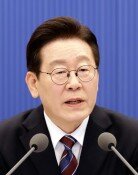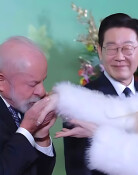[Analysis] What to Expect From New Economic Team
[Analysis] What to Expect From New Economic Team
Posted January. 20, 2009 08:08,
The government yesterday announced its new economic lineup to tackle the financial crisis, with former top financial regulator Yoon Jeung-hyun named strategy and finance minister.
Chin Dong-soo is tapped to take over the Financial Services Commission and Yoon Jin-shik has been named senior presidential secretary for economic affairs.
The distinguished characteristics of the new economic team can be summed up as the revival of the control tower.
People in and out of the government expressed high expectations for next Finance Minister Yoon, who will replace Kang Man-soo as the countrys top economic policymaker.
Yoon said he will exert strong leadership in setting economic policies and speed up measures to fight the looming recession.
Critics, however, say the new economic team of bureaucrats and non-private economic experts will make mistakes if it focuses on short-term achievements.
○ Reshuffle centered on teamwork
Some experts say the first economic team of President Lee Myung-bak, consisting of people from different backgrounds, was helpful in collecting opinions in the beginning of his term, but struggled with speedy decision-making and implementing necessary action.
The first team included two bureaucrats - Kang and presidential senior secretary for economic affairs Bahk Byong-won -- and a private sector financial expert, Financial Services Commission Chairman Jun Kwang-woo.
Yoon is known for his strong commitment to free-market economics, and his drive to act on his belief is believed to have played a role in his appointment.
Serving as Financial Supervisory Service chairman under the former Roh Moo-hyun administration, Yoon vehemently advocated a business-friendly environment and economy-based principles despite state intervention in the financial market.
In line with this, many experts say whether other candidates for economy-related ministerial positions can work in harmony with Yoon was a key factor in their appointments.
In this regard, new senior presidential secretary for economic affairs Yoon Jin-shik is expected to get along with minister-designate Yoon.
While serving as the head of the international financial bureau at the Finance and Economy Ministry in 1994, Yoon Jeung-hyun worked with Yoon Jin-shik in fine-tuning economic policies. In particular, they share the belief that the Bank of Korea should play a certain role in stimulating the economy.
Prior to the reshuffle, the minister-designate expressed fears that few people have financial expertise.
Chin is considered a breath of fresh air for Yoon Jeung-hyun since he has much experience and great expertise from serving at senior posts with the Financial Supervisory Commission, the Securities and Futures Commission and the International Bank for Reconstruction and Development.
○ Three major challenges ahead
The biggest challenges facing the new economic team are stabilizing the financial system, accelerating restructuring and stimulating the economy.
Minister-designate Yoon told reporters yesterday, The crisis is approaching at tremendous scale and speed. The whole nation should be united as one, indicating he will speed up policy implementation.
Stabilizing the financial system is a precondition for implementing economic and financial policies. Experts say the new team should carefully consider to what extent financial institutions can sustain the credit crunch in executing policies.
Also important is a stable foreign exchange rate given the rollercoaster ride the won has endured since the second half of last year.
Additional bankruptcies at financial institutions in the United States or Europe will cause global financial markets to tumble, raising the specter of capital flight in the Korean forex market.
Corporate restructuring is another daunting challenge.
Though the number of businesses forced to close in the first round of restructuring on construction and shipbuilding companies was smaller, the second round is expected to be more drastic since it aims to remove nonviable small and medium-size enterprises.
Without dramatic action, experts warn that the government will lose the trust of the market, resulting in a worsening liquidity crunch.
Coupled with restructuring, stepping up the economic stimulus package is also crucial. The economic slowdown is due to the global financial turmoil, but the government is partly responsible for failing to take preemptive measures to turnaround the sagging economy.
○ Revival of the bureaucratic economy
Ahead of the Cabinet reshuffle, rumors flew of stronger Mofias and weakening EPBs. Mofia is the combination of the terms Ministry of Finance and mafia, while EPB refers to bureaucrats from the Economic Planning Board.
The shake-up of the economic team, similar to the lineup of the same group in the beginning of the Lee administration, was filled with government officials from the finance ministry instead of the board.
Kang, who worked for the ministry, was appointed finance minister.
Bureaucrats at the board are known to value the stability of macroeconomics as represented in indices, while those from the Finance Ministry are believed to favor microeconomics and swift and drastic action.
One expert said, Those from the same background could benefit in accelerating policy implementation but this could lead to the resurrection of the bureaucratic economy.
Shin Min-yeong, a senior researcher at LG Economic Research Institute, said, One constant topic raised related with Minister Kangs economic team was lack of confidence. The incoming team should strive to restore market confidence and minimize the sense of insecurity that is bound to emerge in the process of overcoming the crisis.
legman@donga.com







